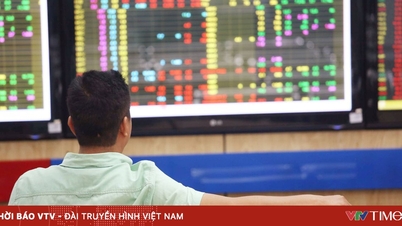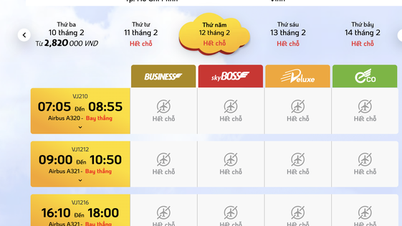On November 17, Mr. Pham Anh Tuan, Director of the Payment Department - State Bank (SBV), said that after more than 4 months of implementing the fraudulent account warning system (SIMO), more than 610,000 customers have proactively suspended or canceled transactions after receiving risk warnings, with a total amount of more than 2,300 billion VND.
Timely warning system
SIMO is a central platform for sharing information about suspected fraudulent accounts between banks, financial institutions and regulatory agencies. The feature of detecting suspected fraudulent accounts of banks operates based on direct connection with the SIMO system.

The banking system automatically alerts account holders when it detects unusual signs. Photo: LE TINH
Statistics show that thousands of cases have avoided damage thanks to the timely warning system. Recently, a business in Ho Chi Minh City received fake text messages and calls, claiming to be a partner related to an educational cooperation program. Because of trust in the partner, this business transferred more than 145 million VND from its account at Asia Commercial Bank (ACB ) to a personal account at another bank. As soon as the unusual signs were detected, the business representative contacted ACB to request support.
ACB said that immediately after receiving the request, the bank urgently reviewed the transaction and compared it with the fraud warning data. Then, it sent a freezing request to the beneficiary bank. Thanks to the quick coordination process, the money was retained on the same day, helping the business avoid losses.
ACB representative said that the bank has set up many layers of automatic protection, in which money transfer transactions to accounts on the warning list will be temporarily stopped to ask customers to re-check their information. In the first 9 months of the year, ACB has prevented more than 30,000 transactions with signs of abnormality, safely protecting more than 2,000 billion VND of customers.
Not only ACB, other commercial banks also recorded clear effectiveness after deploying the warning tool. Deputy General Director of the Vietnam Joint Stock Commercial Bank for Industry and Trade ( VietinBank ), Mr. Tran Cong Quynh Lan, said that the warning feature on the money transfer application has helped more than 173,000 customers promptly cancel transactions, equivalent to more than 320 billion VND being protected.
Specifically, when customers transfer money via the VietinBank iPay Mobile application, the system immediately checks and warns if the recipient's account shows signs of risk such as information not matching the national population database, receiving money from many suspicious accounts or being on the warning list of the authorities. Customers then have enough data to decide whether to continue or stop the transaction. Mr. Quynh Lan emphasized that the Bank only provides risk warnings, does not automatically block transactions to ensure the customer's initiative.
Similarly, the Bank for Investment and Development of Vietnam ( BIDV ) said that over 95,500 of its customers decided to cancel their money transfer transactions after receiving the warning. Thanks to that, they avoided significant losses totaling VND438 billion.
Meanwhile, Tien Phong Bank (TPBank) is the latest unit to deploy the feature of warning about suspected fraudulent accounts across all transaction channels, from the bank's application to the ATM system and over-the-counter transactions. This system helps customers detect early signs of abnormal beneficiary accounts, proactively preventing fraud from the beginning.
Rapid response team to handle fraudulent transactions
According to Mr. Pham Anh Tuan, in the context of Vietnam's payment system developing at the fastest pace in the region, controlling fraud has become more challenging than ever. There are cases where money is transferred through more than 20 banks in just a few minutes, making tracing very difficult.
The SIMO system is deployed to create a safe and transparent payment environment. However, to further reduce fraud, consensus is needed between banks to protect customers. In fact, there are still many accounts that have not fully updated data.
"It is necessary to strengthen control from account opening, wallet opening to monitoring unusual transactions; automate coordination processes between banks; consider setting up a joint coordination center to handle suspicious transactions in real time, even outside working hours," said Mr. Tuan.
According to Dr. Nguyen Quoc Hung, Vice Chairman and General Secretary of the Vietnam Banking Association, to increase the effectiveness of fraud prevention, credit institutions and related units need to appoint focal points to participate in the 24/7 "rapid response team" to coordinate in handling fraudulent transactions in real time; review, complete and supplement internal regulations related to the process of receiving and handling customer feedback.
At the same time, it is necessary to standardize data, forms and information exchange processes between banks, payment intermediaries and authorities, as well as strengthen coordination with the police in verifying and handling cases. This will contribute to reducing fraud and scams in the banking sector, which are increasingly sophisticated and complex.
In fact, some banks have recognized the problem and are enhancing anti-fraud features. For example, Vietcombank has just expanded the feature of warning recipient accounts with signs of suspected fraud (VCB Alert) for money transfer transactions within the bank on VCB Digibank and at the counter.
When customers make online money transfer transactions, the system will automatically issue warnings if the recipient's account shows signs such as: recipient information does not match the national population database; recipient account is on the warning list of a competent state agency; recipient account is on the list of suspected risks...
In case of transactions at the counter, Vietcombank staff will proactively notify customers when the recipient's account shows similar suspicious signs. Based on the warning information, customers can proactively decide whether to continue the transaction or not.
With TPBank, the new system will identify recipient accounts that are involved in fraudulent behavior or are on a verified list of high risks, thereby issuing a warning for the bank to proactively refuse to process the transaction, meaning that customers cannot make money transfers in any form. "This layered approach helps proactively protect users without affecting legitimate transactions, ensuring a balance between safety and a seamless customer experience," said a TPBank representative.
"Dozens of large and small commercial banks have launched warning features after the State Bank deployed the SIMO system. Some banks also directly connected to the Ministry of Public Security's data - A05 to diversify warning sources.
Source: https://nld.com.vn/chan-hang-tram-ngan-giao-dich-dang-ngo-196251117213755753.htm




































![[Photo] General Secretary To Lam and National Assembly Chairman Tran Thanh Man attend the 80th Anniversary of the Traditional Day of the Vietnamese Inspection Sector](https://vphoto.vietnam.vn/thumb/1200x675/vietnam/resource/IMAGE/2025/11/17/1763356362984_a2-bnd-7940-3561-jpg.webp)







































































Comment (0)